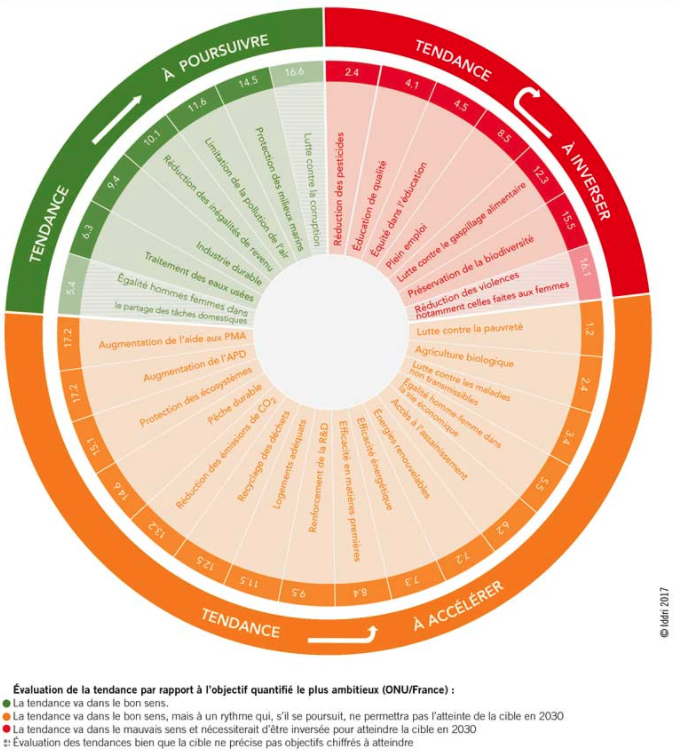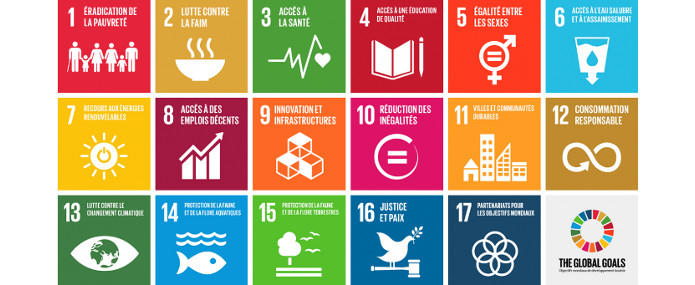In a Policy Brief published in October 2017, IDDRI noted the growing importance—in France—of the United Nations 2030 Agenda for Sustainable Development and its 17 Sustainable Development Goals (ODD). At the time, the French government had just announced—through the Secretary of State at the Ministry for the Ecological and Inclusive Transition—the development of an SDG roadmap. At an interministerial meeting held on 8 February 2018, in the framework of the CICID (Interministerial Committee for International Cooperation and Development), the government reaffirmed its intention to rapidly implement a road map and outlined its main priorities: high-level leadership, public policy review, inclusion of SDGs in the budget process and in impact assessments of future laws.
The SDGs provide a list of all the major global challenges and the transformation needs in the development models of countries. They set targets to be reached on a wide range of topics, including world hunger, education, inequality, pollution, climate change and biodiversity, and one of the key issues of their implementation is to encourage all ministries and administrations to work together, in other words “teaching silos to dance”. Countries are currently testing various solutions, that necessarily depend on national contexts, and it is pleasing to note that the conclusions of the CICID guarantee that SDGs will be supported by an interministerial committee. To be efficient, this committee will have to be sufficiently high level to mobilize all ministries and to lead them towards aligning their public policies with the global objectives.
A new strategic impetus for sustainable development
However, before public policies can be revised, there remains a need to agree on the French situation in relation to the SDGs, the efficiency of current policies and priorities for action. Hence the importance of the public policy review adopted by the government. IDDRI had already highlighted the strengths and weaknesses of France in terms of achieving the SDGs, as well as possible priorities for action (see illustration below).

The government has also confirmed that this work will lay the foundations for a revision of the French Sustainable Development Strategy (NSDS) for 2020-2030. At this juncture, two critical points should be highlighted. The first is to know whether this strategy will only apply to environmental issues—as is currently the case—or to all SDG areas—as in Germany, for example. An intermediate solution could emerge between the two extremes of an ecological silo mentality and a meta-strategy that by trying to tackle everything runs the risk of achieving nothing. In the rationale of mainstreaming that is key to the SDGs, the future NSDS could emphasize the links between environmental policies and, for example, policies of innovation, cooperation, poverty reduction, trade and taxation. The second critical point to underline concerns the level of political support for this strategy, which will determine whether it can be a medium-term structural guide for public action and debate, as well as a mobiliser for NGOs, companies and investors, or merely another report to sit on the shelves of the sustainable development community.
Taking sustainable development out of its own silo
Interministerial steering, public policy review, sustainable development strategy… all these areas on which the CICID has announced it will take action are important. But two others are equally critical, if not more so, in that they could enable the SDGs to exit from their sustainable development silo and to influence two key activities in French politics: budget preparation and debates on new laws.
The first announcement is that the government will align, “where relevant and possible”, its budget performance indicators with the SDGs. At present, for example, the transport programme has seven indicators, such as the proportion of public transport or the market share of major seaports. Are these indicators sufficient for the monitoring and controlling of the necessary mobility transition in France? At the very least, additional indicators should be considered, such as on alternatives to internal combustion engine vehicles or on limitations to accessing mobility. The revision of budget performance indicators in light of the SDGs, if not carried out purely as a token gesture, may prove useful, in that the SDGs provide a comprehensive and coherent framework. They could also provide a novel contribution to improving budget discussions. Other complementary options should also be considered, drawing on experiences gained abroad and in France.
Indeed, as part of its budgeting, France has started experimenting with the use of 10 “wealth indicators” that are complementary to GDP (such as carbon footprint or healthy life expectancy). The 2015 “Sas Act” requires the government to publish an annual report on France’s progress upstream of budget discussions. Unfortunately, this report and these indicators have not become firmly established in French political debate—we are still waiting for the latest report—but the implementation of the SDGs is an opportunity to give them a new lease of life. To this end, various proposals have been raised, notably by OFCE and IDDRI, while others are already under discussion in parliament.
Beyond the budget, the SDGs can influence another key activity in French politics: the design of new laws. In the CICID’s conclusions, the government announced that France will integrate “where relevant” the SDGs into the design of law, by proposing an impact analysis on the achievement of the SDGs. France is already submitting all its legislative proposals to impact studies on the various dimensions of sustainable development. But these studies—which are obscure and often hastily carried out—only rarely feed into public and parliamentary debate or interministerial work, and therefore have little impact on policy coherence. The SDGs provide an opportunity to relaunch this project.
France has accelerated SDG implementation. The broad guidelines of the future road map signed by the government are definitely heading in the right direction. Will the SDGs be useful, mobilizing, transformative? Will they have a real impact on French public orientations and policies? This can only be decided by the details of the roadmap and the actual translation of government guidelines.



